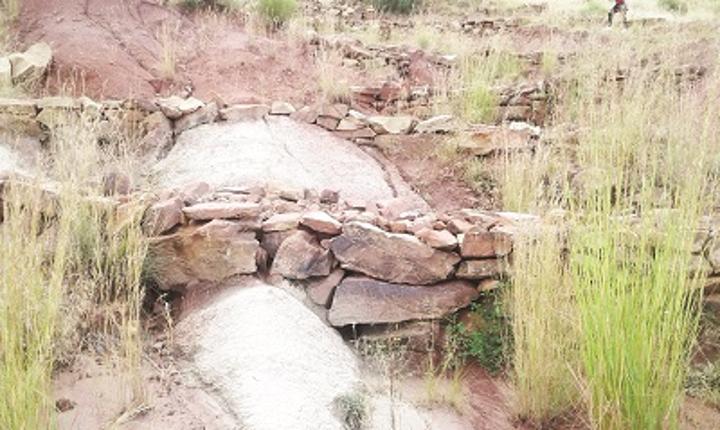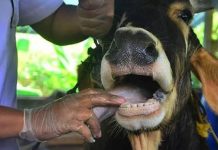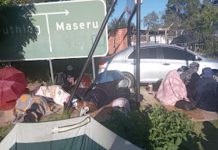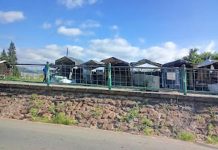Africa-Press – Lesotho. In Lesotho, desertification is a major problem more especially in the southern part of the country and Mafeteng district is no exception as agricultural
lands, range lands and plants are seriously threatened by climate change. World Food Program (WFP) and the Ministry of Forestry, Range and Soil Conservation (MFRSC)
had in 2017 conducted surveys that revealed that the southern districts being Mafeteng, Mohale’s Hoek and Quthing have poor socio-economic status and are at high
risk of climate impacts. In response to these findings and in effort to sustain these communities’ livelihoods despite the impact of climate change, WFP
introduced a project – in 2019 of removal of invasive species ‘Lihalahala’ on the range lands and construction of stonewalls ‘Metseletsele’ to control soil erosion.
Later in 2020, a project implemented by WFP called Improving Adaptive Capacity of Vulnerable and food-insecure populations in Lesotho (IACOV) was introduced to
support the three districts. This is a four year project executed by the government, Lesotho Meteorological Services (LMS) and MFRSC and was funded by
Adaptation Fund (AF) with over M150 million. IACOV project aims to enhance the adaptive capacity and build the resilience of vulnerable and food insecure
households and communities to the impacts of climate change on food security. Makoabating village in Thabana-Morena Constituency Mafeteng Project Coordinator and Foreman
Letuka Lehana said Mafeteng district is one of the places where the soil does not hold moisture for a long time and with low fertile soil because of drought.
He said Makoabating village seems to have been affected mostly by climate change hence the project was inaugurated in that area. “The place also suffers
from high rates of soil erosion and environmental degradation. Elimination of invasive species in our range lands has benefitted us a lot since 2020 as the
soil is now able to maintain its nutrients, which allows the grass to grow,” he noted. He said where invasive species grow, the grass does not grow at all and
their cattle have nowhere to graze. He said stonewalls are the other way to try to trap the run off soil and silt traps along the dongas are to prevent soil being washed away by running water.
He said in this project they work in groups of 68 people who work for three months and at the end of every month, each earn M1 200. Lehana said they work 8
hours per day and they have divided it in such a way that 4 hours is dedicated to removal of invasive species while the other 4 hours, they work in their
homes where they have adapted to climate smart agriculture and they have built ‘mantloane’ to grow crops. He said IAVOC also provided over 200 of high laying chickens which they benefit eggs and meat
from. Lehana further said the aim is to continue looking after their environment and building stone lines even after four years. “We are hopeful that there will be
a new donor who will be attracted by the work WFP and IACOV already introduced to us and we will get another support,” he said. According to Thabana-Morena Chief Moopisa Khasane, Mafeteng is affected by great
desertification as their crops do not survive due to the infertile land. Khasane said because of low production in farming, they tried to seek help from
many organizations with no luck until WFP and IACOV projects came to their rescue. He said the projects have brought so much impact in his community as people are
now able to practice climate smart agriculture as another way of fighting poverty caused by impact of climate change. He said due to drought, their fields have cracked into dongas and they are afraid they are going to lose
their soil. He said removal of invasive species along Thaba-Chitja Mountain was a great success as there is grass already growing and it will be able to trap
soil and protect their wetlands. “Over 200 people are going to benefit from this project as they are going to adapt to ways of living despite the challenges the
world faces due to the presence of climate change,” he said. One of the beneficiaries from IACOV project ‘Mahlalefang Nkunyane said as a single parent who lost her job because of the
outbreak of Coronavirus (COVID-19), she is now able to take care of her family and pay for children’s school fees. She noted that another advantages of this
project is that even during hard lockdowns, they are able to work from the comfort of their homes where they take care of their poultry and crops. “The
only challenge we have is that our crops die from the heat and we would like to be assisted with greenhouses and shade net to protect them,” she said.
National Climate Change Committee (NCCC) Representative Mofihli Phaqane said surveys have revealed that the southern districts are at high chances of being affected by climate change hence as NCCC, they always
support projects that are related to climate change and encourage them to come and assist in the southern districts where there is a big challenge. Phaqane
further said there are great improvements made by IACOV project in Makoabating which indicates that people of that area are adapting to the changes and will
be able to survive the climate change. He said what they do to protect their environment from soil erosion has benefited them a lot because in two years’
time, they will have much grass to allow their cattle to graze. “They are also taught climate smart agriculture and this is another way of farming that allows
crops to be able to survive under any weather conditions,” he said. He said other projects which will continue the work at that place after four years,
they will find great improvements. According to Adaptation (AF) Project document, land degradation is one of the main environmental challenges constraining agricultural productivity and food and
nutrition security in Lesotho. Soil erosion and desertification have been aggraded by recurrent draughts, rapid population growth and increasing pressure
on natural resources, as well as unsustainable land and natural resource management practices. Loss of ground cover on the high land range lands due to
overstocking has resulted in excessive water runoff during mountain storms leading to flash flooding and sheet and gully erosion which is leading to loss
of limited agricultural land. It is estimated that 4.5 million tons of soil is lost though soil erosion per year, thus reducing the productive capacity of the country’s crop lands, range lands and impacting on biodiversity by changing and reducing habitat for wild species.
For More News And Analysis About Lesotho Follow Africa-Press






